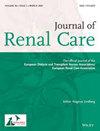Advance care planning intervention in chronic kidney care: A qualitative evaluation
Abstract
Background
Patients with chronic kidney disease and their families request early and continuous advance care planning. Based on user involvement, an advance care planning intervention was developed to support patients, family members and healthcare professionals (HCPs) in advance care planning conversations in a nephrology outpatient setting.
Objective
To explore the experiences and perceptions of an advance care planning intervention among patients with chronic kidney disease, family members and healthcare professionals.
Design
An exploratory qualitative study with a phenomenological-hermeneutic approach.
Participants
Six patients with chronic kidney disease, four family members and four healthcare professionals.
Approach
Semistructured interviews with patients and family members and a focus group interview with healthcare professionals were conducted. Data were analysed using Ricoeur's interpretation theory.
Findings
Patients and their families were impacted in various ways when the patient received the diagnose of chronic kidney disease. The need for an advance care planning intervention was based on a range of individual needs. The intervention supported patients, their family members, and healthcare professionals through open dialogues and reflections about thoughts and concerns. Healthcare professionals' reflected that it might be too early to deliver an increased amount of care.
Conclusion
When the disease challenged family and everyday life, the advance care planning intervention was useable and facilitated an open dialogue and reflections. The advance care planning conversations developed awareness among the patients and family members about their values, preferences, and needs, and supported them in sharing them. There is a need for training in initiating and conducting advance care planning conversations among healthcare professionals.

 求助内容:
求助内容: 应助结果提醒方式:
应助结果提醒方式:


